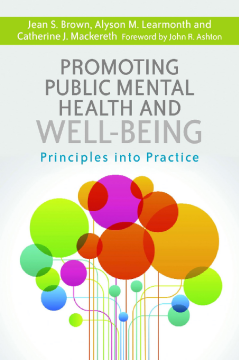
BOOK
Promoting Public Mental Health and Well-being
Catherine J. Mackereth | Jean S. Brown | Alyson M. Learmonth | John R. Ashton
(2014)
Additional Information
Book Details
Abstract
What causes a person to flourish or languish? Or to be well or ill? How can the mental health and well-being of society as a whole, and individuals, be promoted and enhanced?
This book explores the social, economic, political, cultural and environmental factors that affect mental health and well-being on a societal and individual level, and how prevention and intervention can enhance mental health. Taking a holistic approach to mental health, the book sets out effective strategies, from creating a supportive environment to building personal skills. Three extended case studies demonstrate how principles can be applied in practice in different situations: a specific social problem (suicide); a population group (young Black and minority ethnic groups); and a medically defined problem (people with long term conditions).
The book is a vital resource for strategic planners (including commissioners) working to promote mental health and wellbeing at a population level, as well as operational services delivering to specific individuals and groups. It addresses the role of generic service providers as well as being essential reading for mental health and public health students.
Adopting a whole of government approach to mental health and wellbeing at both national and local levels is essential to meet the challenges posed by this text. It offers front-line practitioners and strategic planners valuable tools and examples to enable multi-agency working to succeed.
David J Hunter, Professor of Health Policy and Management, Durham University
Generally, the style was concise and clear, with key points sections at the start of each chapter, reasonable text layout (although admittedly a bit bland), and a summary/coming up section at the end of each chapter. Relevant policy and legislation are outlined in a helpful rather than tokenistic way, and generally the references and anecdotal case studies seem to be pertinent and informative. Overall, this is a recommended read.
Dr Alexandra Quigley
Journal of Mental Health
Not many books are scholarly and accessible, firmly planted in research and also useful to clinical practitioners, policy makers and managers. This book works at all these levels. The analysis clearly sets out the scale of the problem, the factors that affect mental health and the policies and approaches most likely to bring improvement. The case studies give depth of understanding. The book is a powerful challenge to everyone concerned with mental health issues and reminds us of the dangers of increasing inequality for the most vulnerable in our society and "the vicious spiral in which circumstances adversely affect mental well-being and mental ill health affects circumstances".
Ken Jarrold CBE, Chair of the NHS Trust providing mental health services in North Staffordshire, former Chair of the National Reference Group for Health Inequalities and former member of the National Mental Health Task Force
Jean S. Brown is a Public Health Consultant and mental health epidemiologist, working on a freelance basis.
Alyson M. Learmonth retired in 2012 from her post as Director of Public Health in Gateshead, with a special interest in inequalities, as well as evidence-based commissioning. She remains professionally active, particularly in relation to the application of health impact assessment.
Catherine J. Mackereth is a Public Health Consultant with leadership for adults and older people, working in Scotland; until 2013 she was involved in commissioning Mental Health services using an integrated model of care in the North East of England.
There was a time when psychiatrists turned their backs on public health, and public health people 'forgot' mental health. This push to promote public mental health is as welcome as it is timely. It has the potential to improve health, and reduce health inequalities, globally.
Sir Michael Marmot, Director, UCL Institute of Health Equity
Despite Government commitment to greater parity for mental health in England it remains the poor relative with action and funding still too focussed on treatment and behaviour change. This book provides a powerful argument for a broader social determinants of health approach which will help local champions for this agenda. Its emphasis on community action and development is particularly refreshing - recognising the important role that citizens must play if we are to make progress on this agenda.
Mark Gamsu FFPH (Visiting Professor Leeds Beckett University) and co-author of People Centred Public Health
